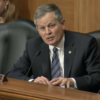2024 Senate races that will determine the majority

The competition for control of the U.S. Senate in 2024 is already underway, with Republicans strategizing to flip the chamber. In the upcoming election cycle, a total of 34 Senate seats are at stake. Democrats face the challenge of defending 23 seats, while Republicans have to protect only 11. The majority of competitive seats currently belong to Democrats, placing them in a defensive position as Senate Majority Leader Chuck Schumer (D-NY) strives to maintain his slim majority.
As of now, Democrats and their independent allies hold 51 seats in the chamber. Seven Senate Democrats up for reelection are in states that supported former President Donald Trump in either 2016, 2020, or both. Conversely, there are no Republican seats in states won by Hillary Clinton in 2016 or President Joe Biden in 2020.
The retirement announcement of Sen. Joe Manchin (D-WV) in mid-November has added to the challenges for Senate Democrats in 2024. With the absence of a long-time incumbent, Republicans see a significant opportunity to gain a Senate seat, especially as West Virginia has been leaning towards the GOP.
Senate Republicans are closely monitoring the reelection race of indicted Sen. Bob Menendez (D-NJ) in New Jersey. Although the state traditionally leans Democratic, the federal prosecution of Senator Menendez opens the door for Republicans to make the race more competitive.
These the Senate races to watch in 2024 that will likely determine what party controls the upper chamber.
Montana: Senator Jon Tester (D)
Senator Tester’s seat is a prime target for Republicans aiming to turn the state in their favor. Tester, who has held the position since 2007, has proven to be a resilient candidate, making it challenging for Republicans to unseat him.
In the ongoing race, two GOP contenders have entered the fray: former Navy SEAL Tim Sheehy and former Montana Secretary of State Brad Johnson. While Representative Matt Rosendale (R-MT) has expressed interest, he has not officially declared his candidacy and raised only $250,000 in the third quarter.
Sheehy, recruited by the National Republican Senatorial Committee, enjoys endorsements from Senators Steve Daines (R-MT), Tom Cotton (R-AK), Marsha Blackburn (R-TN), John Thune (R-SD), and Governor Greg Gianforte (R-MT).
Ohio: Sen. Sherrod Brown (D)
Brown is encountering his most challenging reelection campaign to date in a state that has been leaning towards the Republican Party over the past decade. The spotlight is now on Republican entrepreneur Bernie Moreno, who recently received an endorsement from former President Trump in the Ohio Senate primary.
In competition with Moreno are Ohio Secretary of State Frank LaRose and State Senator Matt Dolan. LaRose, despite previous criticisms of Trump, recently secured the former president’s endorsement during his 2022 run for Ohio secretary of state and also endorsed Trump in the 2024 election. Dolan, on the contrary, has distanced himself from the former president.
Given Trump’s success in carrying Ohio twice and his influential endorsement in last year’s GOP primary, where Senator J.D. Vance secured victory, the general election is anticipated to be a prominent contest this cycle. Brown faces the challenge of winning over a reliably Republican electorate, regardless of the eventual GOP nominee.
Arizona: Sen. Kyrsten Sinema (I)
Less than a year before a significant election in one of the nation’s key battleground states, consensus eludes experts on both ends of the political spectrum: the 2024 Senate race in Arizona remains uncertain. Potential contenders include Sinema, who departed from her party to become an independent last year; Rep. Ruben Gallego (D-AZ), the probable Democratic nominee who declared his candidacy in January; and Republican Kari Lake, a divisive conservative who faced defeat in the gubernatorial election last year. This scenario may lead to a three-way competition in a state where party affiliations are distributed as 34% Republican, 34% independent, and 30% Democratic, as per Arizona’s data.
Sinema has not disclosed her intentions regarding a second term after leaving the Democratic Party. Lake, on the other hand, must first overcome the challenge posed by Pinal County Sheriff Mark Lamb in the GOP primary. The outcome of these dynamics remains unpredictable as the state gears up for a consequential electoral contest.
Pennsylvania: Sen. Bob Casey (D)
Casey is gearing up for his most challenging reelection battle, with Republicans rallying behind Dave McCormick, a former hedge fund executive, since he entered the race in September.
McCormick’s candidacy marks a significant victory for Senate Republicans, who diligently worked to recruit him as the contender against Casey, a three-term senator who secured a 13-percentage-point victory in 2018. In the previous cycle, McCormick narrowly lost the Senate primary to celebrity doctor Mehmet Oz, who subsequently lost to Sen. John Fetterman (D-PA) in the general election, contributing to Democrats maintaining control of the Senate. Since then, GOP leadership has focused on encouraging McCormick to run again, recognizing him as a formidable candidate with the potential to flip Casey’s seat.
McCormick’s campaign will be a crucial test to determine if Republicans can turn a battleground state in their favor. Pennsylvania, a state with a history of being contested, had both Republican and Democratic senators for over a decade until Senator Pat Toomey retired in January. Casey finds himself among a group of five Senate Democrats from states that President Biden won by less than 4 percentage points in 2020.
Related Stories:
-
 Taxpayer group urges Trump, Congress to confront rising federal debt
Taxpayer group urges Trump, Congress to confront rising federal debt
-
 Daines Says Tariff on Russian Palladium Safeguards Montana Mining
Daines Says Tariff on Russian Palladium Safeguards Montana Mining
-
 Trump announces new tariffs with ‘certainty’ after Supreme Court ruling
Trump announces new tariffs with ‘certainty’ after Supreme Court ruling
-
 Feds Launch Whistleblower Portal Targeting Fraud
Feds Launch Whistleblower Portal Targeting Fraud
-
 War Department, USDA Team Up on National Security
War Department, USDA Team Up on National Security
-
 Western senators propose wastewater program renewal
Western senators propose wastewater program renewal





